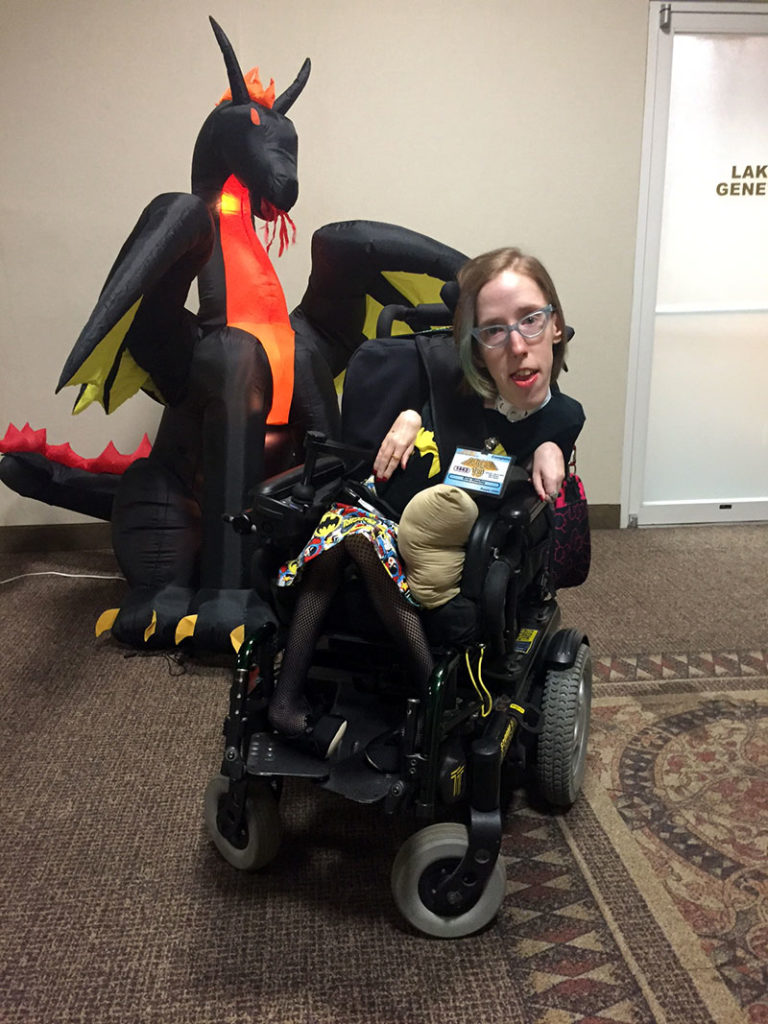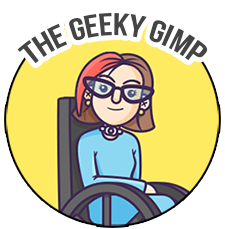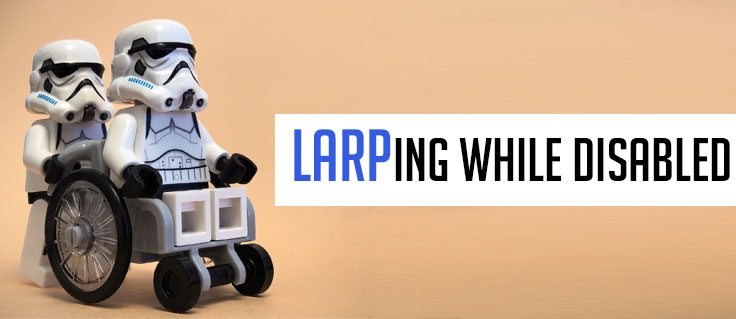It’s been a few weeks since I attended Dreamation, a tabletop and LARP convention in New Jersey. I’m more of a board gamer, and my only experience with RPGs has been online. I play-tested a LARP about disability at a previous convention, but beyond that, I’ve yet to break into the hobby. My boyfriend Michael is into LARP, so I decided to go out of my comfort zone and play a full game. At the least, I would get blog material; the worst outcome would be me spiraling into anxiety mode and quitting. I ended up playing two LARPs that weekend, taking away a new understanding of myself and the space I inhabit as a disabled woman at a convention.
The hotel hosting the event was ADA compliant, with elevators, smooth flooring, automatic doors, table seating near the bar, and spacious rooms. The folks running Dreamation also had a disability liaison on hand (the amazing Elsa), and attentive staff aware of potential access needs. Because organizers give attention to safety and accessibility, a lot of disabled people attend; not just physically disabled, but mentally and chronically ill gamers were in abundance. So I knew if I had a problem in-or-out of the game, Dreamation’s staff would support me and find a solution. Other conventions should follow this pattern for disabled attendees.

Outside of the LARPs, I encountered the usual ableism, but seeing it juxtaposed with my in-game experience was enlightening. The first title we played was She’s Got a Gun by Tara Clapper, a game made to address sexism and marginalization, with different modules and settings to choose from. I was nervous, unsure of my skills and how people would interact with me. It is rare for strangers to address me – they either speak to my caregiver or ignore me entirely. It’s easy to feel invisible as a disabled person in public spaces; it’s also easy to feel hyper-visible if others give you unwanted attention because of your disability. In a LARP, though, we must talk with each other to progress the story.
In this game, I made the mistake of picking the lead role as Commander of a starship – yes, I wanted to be Spock-like. However, this meant everyone relied heavily on me to move along the plot. I’m still getting used to verbal communication in public, and have trouble going from what I’m thinking to what I’m saying. But through working my day job and hosting podcasts, I’m getting better – it’s a process. In Tara’s LARP, I threw myself into the deep end through my own volition. This game was free-form, and I could have used more structure, but I did okay; others acknowledged my struggle and helped with ideas in-character. There were also hand signals utilized in the game, like lifting your arm over your head to signal out-of-character dialogue or that you had to leave for any reason; I couldn’t physically do these signals, but I verbally stated my needs and that worked fine. I’m positive Tara could come up with other solutions if needed.
As a disabled person, I liked the level of engagement from the other players; they may have been uncomfortable at first, but everyone eased into the game after a half hour or so. It was weird for me to have that ableist barrier removed, and to speak with abled and other disabled people on a level field; weird in the unusual, uncommon, delightfully-rare way. Even out-of-character moments were pleasant, and I didn’t feel like an outlier listening to others plan; we were cohesive, equally putting in suggestions and helping each other with any confusion. Being a shy person, coupled with my anxiety, I acknowledge I have trouble speaking out and validating my opinions; but in a LARP, I had more control and agency. I was playing the part of a commander with unquestioned autonomy; the confidence gained in that LARP is something I can use in the real world.
After She’s Got a Gun, all the players had a debrief, talking about what we took away from the experience, what we found challenging, and what we want to leave behind. I brought up everything mentioned above, including the initial nervousness and unfortunately poor decision to play a core role. These after-game chats are common in LARPs (so I’m told), and they are an element I’d like to see framed as an accessibility feature. They’re helpful in rearranging any bizarre headspace you may be in following the event, and is time needed to bring forth any barriers you encountered while playing.
The next day, my boyfriend and I played Jason Morningstar’s new LARP, Morgard, an otherworld setting based on 14th-century politics. Since this game had more people and was structured differently with cards, powers, and other slightly inaccessible components, Michael and I decided to play a married couple so he could assist me as needed. My character was a queen, and he was my royalty-less husband. Oddly, I took a dominant role again, but this time I had more guidance and could refer to my boyfriend when I felt confused or overwhelmed. The folks we played with were wonderful, talking directly to me and getting on my level to show me maps and other visual elements. The designer, Jason, also spoke to us beforehand to see how he could make the experience more accessible, which was great. Communication is vital, as all access needs are unique for each person – Jason checking in before the event alleviated much of the stress I felt going in.
Overall, I enjoyed Dreamation. The convention was small enough that it didn’t overwhelm but big enough to offer players lots of game variety. Some moments were frustrating, like trying to navigate the crowded tables during busy hours, waiting for an elevator, and the occasional well-meaning but patronizing comments about my wheelchair. But most everyone we encountered was a delight, and I loved seeing professional nerds in their element. During the hours we were in the game, I found out how vocal and assertive I could be, even if I was only commanding a make-believe starship. I saw how people should interact and communicate with me if they worked beyond their prejudices. If you’re in the area next time, stop by – I’d love to LARP with you.
Feel free to leave a comment below about your experiences at conventions, or send a tweet to me @geekygimp!


Thank you for sharing your experiences LARPing. I’m helping to organize the Gaming Department at WisCon this year, and we’ll be taking your experiences as a disabled gamer into account when running our RPGs, LARPs, and tabletop games, sharing the basic concepts with our game facilitators. Much gratitude!
Oh my gosh, that’s awesome! I feel so honored – this is why I write my blog 🙂 Please keep me updated with how things go, I may have to plan a trip to WisCon.
I learned about your blog from rahdo’s mention about your review of Paperback. Haven’t read it yet but based on your review on LARP, I feel confident that I might actually say yes if I have an opportunity to try LARP in that he future. Thanks for the balanced review.
Awesome, thanks for reading 🙂
Great write up! I was also at Dreamation! Thanks for sharing! I run a Roleplaying /Larp / MegaGame Weekend dragonthronesgame.com – and I’ll definitely be taking your experiences to heart when updating and designing our game! We have many different accessibility features, and we continue adding while learning what needs exist and I appreciate you writing about yours! Gaming should be for everyone!
Chris
Thanks so much!